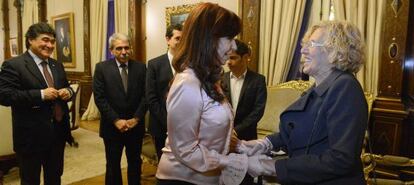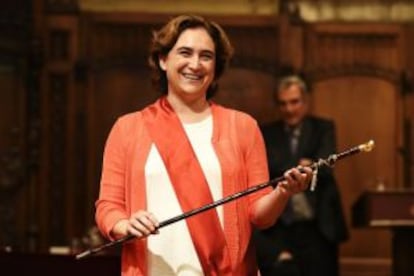Madrid Mayor Manuela Carmena gets star treatment in Buenos Aires
Argentinean president sees Spanish capital’s new leftist leader as symbol of change


Madrid’s new mayor, Manuela Carmena, has become a kind of star in Buenos Aires, where people follow Spanish politics closely and where there has been great interest in the changes that came in the wake of the triumphs of both her and new Barcelona Mayor Ada Colau in the May municipal elections.
President Cristina Fernández de Kirchner certainly gave that impression when she welcomed Carmena at the Casa Rosada presidential palace this week almost as if she were a head of state.
The two were joined by several high-level officials, including Cabinet Chief Aníbal Fernández, Carlos Zannini, the president’s aide and legal secretary, and President’s Office chief Eduardo de Pedro, a rising star within the administration. The executive office published photos and videos of the meeting.
There is a strong link between members of the political left on both sides of the Atlantic
Also in attendance at the Thursday meeting were Argentina’s ambassador to Spain, Carlos Bettini, an old childhood friend of the president, and Hugo Sigman, a well-known Argentinean businessman and film producer who backed the recent hit Wild Tales, who has strong ties to Spain.
Although Carmena was in Buenos Aires to present her new book, Por qué las cosas pueden cambiar (or, Why things can change), it was clear that the meeting was of a political nature.
Argentinean sources said the leaders talked about their experiences in left-wing politics, and that both women shared a deep political and personal affinity.
Fernández de Kirchner, who is due to leave office in December, spoke about her 12 years in power while Carmena, who at 71 has just started her political career, talked about the many projects she has underway. She told the local press she will only be in office for four years before returning to her “delicious life of retirement.”
After a summer filled with much controversy over the cost of her vacation stay in Cádiz, Carmena is taking a break in Buenos Aires before returning to the political arena in Madrid. The atmosphere she encountered in Argentina was completely different from the one she normally experiences back home, where she receives strong criticism from various center-right parties.
Fernández de Kirchner and her circle see Carmena as an influential member of the European left and as a symbol of change within Spanish society. The Argentinean press took great interest in Carmena and Colau’s election triumphs in Spain’s two biggest cities.
“Look what’s happening in Europe,” Fernández said on May 25 as thousands of people watched and applauded from Plaza de Mayo, the emblematic square in front of the presidential palace. “Two women have won in Barcelona and in Madrid. A social activist and a 71-year-old former judge who had a business that helped ex-convict women. There is a new world; let's not let them put blinkers on us any more.”

Fernández de Kirchner, who inspires deep alliances and fierce hatred, is on track to leave office with high approval ratings, especially among the working classes. But other sectors, dissatisfied with her style of government, will be voting against her supporters.
Carmena’s style, on the other hand, is much less fiery. Though she insists on her independence, she did run for office as leader of a platform backed by new leftist party Podemos, a group that closely monitors the Latin American left, especially in Argentina.
There is a strong link between members of the left on both sides of the Atlantic. Some of the most important members within Podemos and in Ada Colau's camp are from Argentina and the party recognizes the intellectual influence of late Argentinean philosopher Ernesto Laclau.
Translation by Dyane Jean François
Tu suscripción se está usando en otro dispositivo
¿Quieres añadir otro usuario a tu suscripción?
Si continúas leyendo en este dispositivo, no se podrá leer en el otro.
FlechaTu suscripción se está usando en otro dispositivo y solo puedes acceder a EL PAÍS desde un dispositivo a la vez.
Si quieres compartir tu cuenta, cambia tu suscripción a la modalidad Premium, así podrás añadir otro usuario. Cada uno accederá con su propia cuenta de email, lo que os permitirá personalizar vuestra experiencia en EL PAÍS.
¿Tienes una suscripción de empresa? Accede aquí para contratar más cuentas.
En el caso de no saber quién está usando tu cuenta, te recomendamos cambiar tu contraseña aquí.
Si decides continuar compartiendo tu cuenta, este mensaje se mostrará en tu dispositivo y en el de la otra persona que está usando tu cuenta de forma indefinida, afectando a tu experiencia de lectura. Puedes consultar aquí los términos y condiciones de la suscripción digital.








































